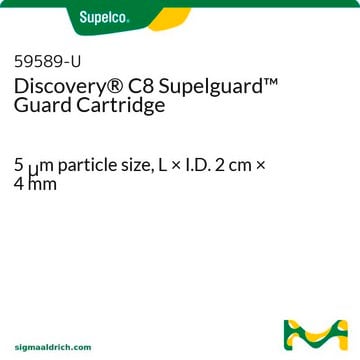59588-U
Discovery® C8 (5 µm) HPLC Columns
L × I.D. 2 cm × 2.1 mm Supelguard Guard Cartridge, pkg of 2 ea, Guard Cartridge holder required for use
Synonym(s):
C8 TM=["Supelguard"]guard column
About This Item
Recommended Products
product name
Discovery® C8 Supelguard Guard Cartridge, 5 μm particle size, L × I.D. 2 cm × 2.1 mm
material
stainless steel column
Quality Level
Agency
suitable for USP L7
product line
Discovery®
feature
endcapped
packaging
pkg of 2 ea
technique(s)
HPLC: suitable
LC/MS: suitable
L × I.D.
2 cm × 2.1 mm
surface area
200 m2/g
matrix
fully porous particle
matrix active group
C8 (octyl) phase
particle size
5 μm
pore size
180 Å
operating pH
2-8
application(s)
food and beverages
separation technique
reversed phase
Looking for similar products? Visit Product Comparison Guide
Choose from one of the most recent versions:
Certificates of Analysis (COA)
Sorry, we don't have COAs for this product available online at this time.
If you need assistance, please contact Customer Support.
Already Own This Product?
Find documentation for the products that you have recently purchased in the Document Library.
Related Content
Discovery C18 and C8 HPLC Columns products offered
Our team of scientists has experience in all areas of research including Life Science, Material Science, Chemical Synthesis, Chromatography, Analytical and many others.
Contact Technical Service



